can与could的用法及练习
情态动词can与could用法归纳
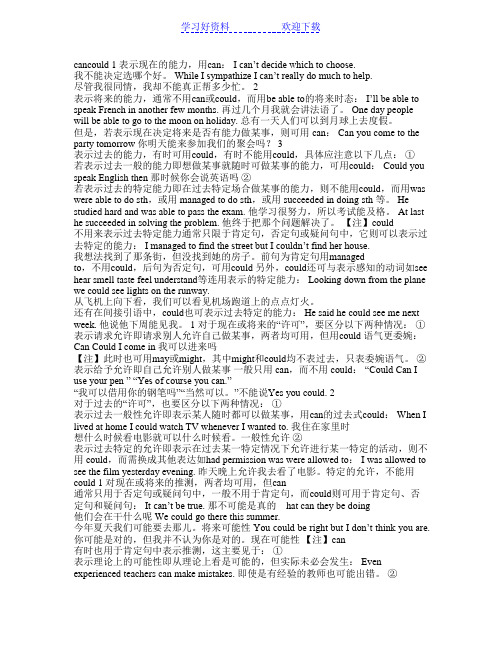
cancould 1 表示现在的能力,用can: I can’t decide which to choose.我不能决定选哪个好。
While I sympathize I can’t really do much to help.尽管我很同情,我却不能真正帮多少忙。
2表示将来的能力,通常不用can或could,而用be able to的将来时态: I’ll be able to speak French in another few months. 再过几个月我就会讲法语了。
One day people will be able to go to the moon on holiday. 总有一天人们可以到月球上去度假。
但是,若表示现在决定将来是否有能力做某事,则可用 can: Can you come to the party tomorrow 你明天能来参加我们的聚会吗? 3表示过去的能力,有时可用could,有时不能用could,具体应注意以下几点:①若表示过去一般的能力即想做某事就随时可做某事的能力,可用could: Could you speak English then 那时候你会说英语吗②若表示过去的特定能力即在过去特定场合做某事的能力,则不能用could,而用was were able to do sth,或用 managed to do sth,或用 succeeded in doing sth 等。
He studied hard and was able to pass the exam. 他学习很努力,所以考试能及格。
At last he succeeded in solving the problem. 他终于把那个问题解决了。
【注】could不用来表示过去特定能力通常只限于肯定句,否定句或疑问句中,它则可以表示过去特定的能力: I managed to find the street but I couldn’t find her house.我想法找到了那条街,但没找到她的房子。
can 和 could 表示推测的用法
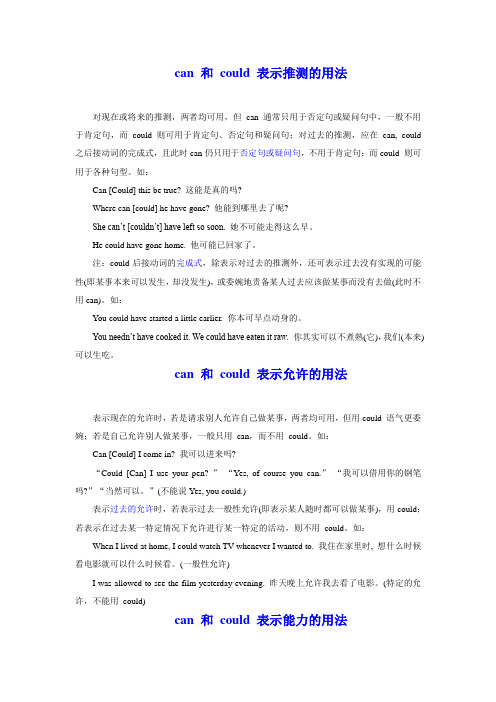
can 和could 表示推测的用法对现在或将来的推测,两者均可用,但can 通常只用于否定句或疑问句中,一般不用于肯定句,而could则可用于肯定句、否定句和疑问句;对过去的推测,应在can, could 之后接动词的完成式,且此时can仍只用于否定句或疑问句,不用于肯定句;而could 则可用于各种句型。
如:Can [Could] this be true? 这能是真的吗?Where can [could] he have gone? 他能到哪里去了呢?She can’t [couldn’t] have left so soon. 她不可能走得这么早。
He could have gone home. 他可能已回家了。
注:could后接动词的完成式,除表示对过去的推测外,还可表示过去没有实现的可能性(即某事本来可以发生,却没发生),或委婉地责备某人过去应该做某事而没有去做(此时不用can)。
如:You could have started a little earlier. 你本可早点动身的。
You needn’t have cooked it. We could have eaten it raw. 你其实可以不煮熟(它),我们(本来)可以生吃。
can 和could 表示允许的用法表示现在的允许时,若是请求别人允许自己做某事,两者均可用,但用could 语气更委婉;若是自己允许别人做某事,一般只用can,而不用could。
如:Can [Could] I come in? 我可以进来吗?“Could [Can] I use your pen? ”“Yes, of course you can.”“我可以借用你的钢笔吗?”“当然可以。
”(不能说Yes, you could.)表示过去的允许时,若表示过去一般性允许(即表示某人随时都可以做某事),用could;若表示在过去某一特定情况下允许进行某一特定的活动,则不用could。
英语中情态动词can和could的用法及例句
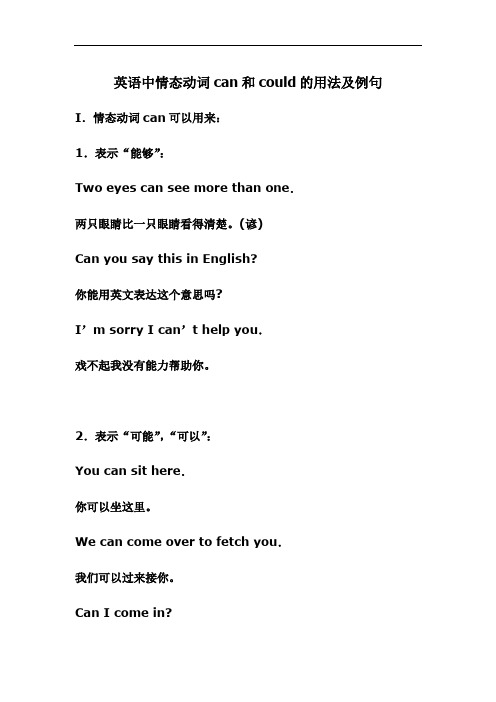
英语中情态动词can和could的用法及例句I.情态动词can可以用来:1.表示“能够”:Two eyes can see more than one.两只眼睛比一只眼睛看得清楚。
(谚)Can you say this in English?你能用英文表达这个意思吗?I’m sorry I can’t help you.戏不起我没有能力帮助你。
2.表示“可能”,“可以”:You can sit here.你可以坐这里。
We can come over to fetch you.我们可以过来接你。
Can I come in?我可以进来吗?3.(用在疑问及否定句中)表示惊异不可能等(后面有时可跟完成及进行形式):She can’t be serious.她不可能是当真的。
How call you be so silly?你怎么这样傻?Where can he have gone?他能到哪里去了呢?What can she be doing now?她现在能在干什么呢?II.情态动词could可以用来表示:1)能够:Nobody conld answer that question.没人能回答那个问题。
It was so dark,we couldn’t see anything.天那样黑我们什么也看不见。
2)可能,可以:He said he couldn’t come.他说他不能来。
I said we could go by boat.我说我们可以坐船去。
2.可以用来代替can,比较委婉地提出请求用法等(a)或是表示惊异不相信等(b):a.Could you do me a favor?你能帮我一个忙吗?We could send the parcel by air mail.这包裹可以航空寄去。
b.How could he be so rude?他怎么这样粗鲁无礼?They couldn’t have left so soon.他们不可能走得这么早。
can与could的用法详解及情态动词有关习题

c a n与c o u l d的用法详解及情态动词有关习题Company Document number:WTUT-WT88Y-W8BBGB-BWYTT-19998can与could的用法详解一、表示能力(1)表示现在的能力,用can:My sister can drive. 我妹妹会开车。
Everyone here can speak English. 这儿人人会说英语。
(2)表示将来的能力,通常不用can或could,而用be able to的将来时态:I’ll be able to speak French in another few months. 再过几个月我就会讲法语了。
One day people will be able to go to the moon on holiday. 总有一天人们可以到月球上去度假。
但是,若表示现在决定将来是否有能力做某事,则可用 can:Can you come to the party tomorrow 你明天能来参加我们的聚会吗(3)表示过去的能力,有时可用could,有时不能用could,具体应注意以下几点:①若表示过去一般的能力(即想做某事就随时可做某事的能力),可用could:Could you speak English then 那时候你会说英语吗②若表示过去的特定能力(即在过去特定场合做某事的能力),则不能用could,而用w as (were) able to do sth,或用 managed to do sth,或用 succeeded in doing sth 等。
He studied hard and was able to pass the exam. 他学习很努力,所以考试能及格。
At last he succeeded in solving the problem. 他终于把那个问题解决了。
【注】could 不用来表示过去特定能力通常只限于肯定句,否定句或疑问句中,它则可以表示过去特定的能力:I managed to find the street, but I couldn’t find her house. 我想法找到了那条街,但没找到她的房子。
can与could用法归纳

can与could用法归纳、表示能力(1) 表示现在的能力,用can:lean ' t decide which to choose. 我不能决定选哪个好。
While I sympathize, I can ' t really do much to help. 尽管我很同情,我却不能真正帮多少忙。
(2) 表示将来的能力,通常不用can或could,而用be able to 的将来时态:I ' ll be able to speak French in ano ther few mon ths. 再过几个月我就会讲法语了。
One day people will be able to go to the moon on holiday. 总有一天人们可以至U月球上去度假。
但是,若表示现在决定将来是否有能力做某事,则可用can :Can you come to the party tomorrow? 你明天能来参加我们的聚会吗?(3) 表示过去的能力,有时可用could,有时不能用could,具体应注意以下几点:①若表示过去一般的能力(即想做某事就随时可做某事的能力),可用could :Could you speak English then? 那时候你会说英语吗?②若表示过去的特定能力(即在过去特定场合做某事的能力),则不能用could,而用was (were) able to do sth ,或用man aged to do sth ,或用succeeded in doing sth 等。
He studied hard and was able to pass the exam. 他学习很努力,所以考试能及格。
At last he succeeded in solvi ng the problem. 他终于把那个问题解决了。
【注】could不用来表示过去特定能力通常只限于肯定句,否定句或疑问句中,它则可以表示过去特定的能力:I man aged to find the street, but I could n ' t find her house. 我想法找至到了那条街,但没找到她的房子。
英语语法学习----情态动词can, could的用法

英语语法学习----情态动词can, could的用法
(1)can的用法
can表示某人具有某种能力,意思为“能,会”,也表示客观的可能性,是“能够,可能”的意思。
后接动词原形,适用于所有人称。
(2)could的用法
could为can的过去式,表示“能,可以”,另外could可用来代替can,表示更为客气委婉的语气,用来提出要求,但回答时不能用could,而要用can.
Could you swim when you were young? No, I couldn’t. (问能力) Could I smoke here? No, you can’t. (表示委婉的请求)
其他回答:Go ahead./Help yourself./No problem./You’d better not./I’m afraid you can’t.
II、感叹句的用法
感叹句用来表示强烈的感情,能表达愤怒、悲哀、惊奇、厌恶和赞赏等。
句末用感叹号“!”,读时用降调。
在口语中常用省略句,后面的主语和谓语往往省略,有时只用一个词或词组表达。
(1)以what开头的感叹句,what作定语,修饰名词(名词前可有其他定语),可数名词单数形式前要加不定冠词a(an)。
句型:What (a/an)+adj.+n.(+s+v)! 如:
What a clever boy(he is )! 多么聪明的孩子!。
can与could用法归纳

c a n与c o u l d用法归纳 Company Document number:WTUT-WT88Y-W8BBGB-BWYTT-19998can与could用法归纳一、表示能力(1)表示现在的能力,用can:I can’t decide which to choose.我不能决定选哪个好。
While I sympathize, I can’t really do much to help.尽管我很同情,我却不能真正帮多少忙。
(2)表示将来的能力,通常不用can或could,而用be able to的将来时态:I’ll be able to speak French in another few months.再过几个月我就会讲法语了。
One day people will be able to go to the moon on holiday.总有一天人们可以到月球上去度假。
但是,若表示现在决定将来是否有能力做某事,则可用can:Can you come to the party tomorrow你明天能来参加我们的聚会吗(3)表示过去的能力,有时可用could,有时不能用could,具体应注意以下几点:①若表示过去一般的能力(即想做某事就随时可做某事的能力),可用could:Could you speak English then那时候你会说英语吗②若表示过去的特定能力(即在过去特定场合做某事的能力),则不能用could,而用was (were) able to do sth,或用managed to do sth,或用succeeded in doing sth等。
He studied hard and was able to pass the exam.他学习很努力,所以考试能及格。
At last he succeeded in solving the problem.他终于把那个问题解决了。
can和could的用法

can和could的用法1. 表示能力或客观可能性,还可以表示请求和允许.如:Can you finish this work tonight?Man cannot live without air.—Can I go now? —Yes, you can.注意:①could也可表示请求,语气委婉,主要用于疑问句,不可用于肯定句,答语应用can (即could不能用于现在时态的简略答语中).如:Could I come to see you tomorrow?Yes, you can. (否定答语可用No, I'm afraid not.)②can表示能力时,还可用be able to代替.如:I'll not be able to come this afternoon.2. 表示惊异、怀疑、不相信的态度.(主要用在否定句、疑问句或惊叹句中)Can this be true?How can you be so careless!This cannot be done by him.3. “can(could) + have + 过去分词”的疑问或否定形式表示对过去发生的行为怀疑或不肯定.如:He cannot have been to that town.Can he have got the book?4. 用在疑问句及否定句中,表示惊讶,不相信等.5. cannot```too\enough表示"无论怎样``````也不过分","越``````越好"can (could) 表示说话人能,可以,同意,准许,以及客观条件许可,could 为can 的过去式.Can you pass me the books?你能给我递一下书吗?Could you help me, please?请问,你能帮助我吗?What can you do?你能干点什么呢?Can you be sure?你有把握吗?can 和could 只能用于现在式和过去式两种时态,将来时态用be able to 来表示.He could help us at all.他完全可以帮助我们.Can you tell me 和Could you tell me的区别是什么?两者的意思一样都是你能不能告诉我...的意思但是后者的语气更加委婉含有一种征求对方同意的感觉可以,但是could you 是比较有恳求的意思,而can you 是比较有命令口气的,意思相同Would youWould是will的过去式,但它也是一个情态动词。
情态动词can和could的用法
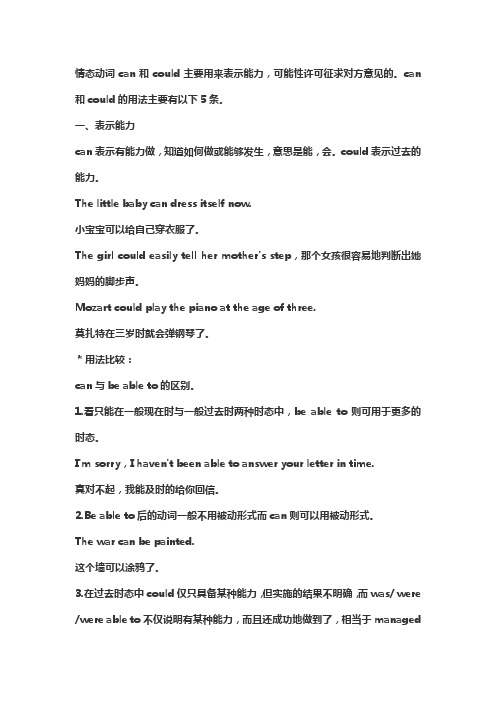
情态动词can和could主要用来表示能力,可能性许可征求对方意见的。
can 和could的用法主要有以下5条。
一、表示能力can表示有能力做,知道如何做或能够发生,意思是能,会。
could表示过去的能力。
The little baby can dress itself now.小宝宝可以给自己穿衣服了。
The girl could easily tell her mother's step,那个女孩很容易地判断出她妈妈的脚步声。
Mozart could play the piano at the age of three.莫扎特在三岁时就会弹钢琴了。
*用法比较:can与be able to的区别。
1.看只能在一般现在时与一般过去时两种时态中,be able to则可用于更多的时态。
I'm sorry,I haven't been able to answer your letter in time.真对不起,我能及时的给你回信。
2.Be able to后的动词一般不用被动形式而can则可以用被动形式。
The war can be painted.这个墙可以涂鸦了。
3.在过去时态中could仅只具备某种能力,但实施的结果不明确,而was/ were /were able to不仅说明有某种能力,而且还成功地做到了,相当于managedI talked with the boy for a long time and eventually I was able to make him believe me.我和那个男孩谈了很久,最终还是让他相信了我的话。
二、表示可能性1.用在肯定句中,表示理论上的可能性,指常有的行为或情形,意思是有时会……。
Tom can be really annoying.他们有时的确令人讨厌。
It can be very hot here in summer.这里夏天有时会很热。
can和could表推测的用法
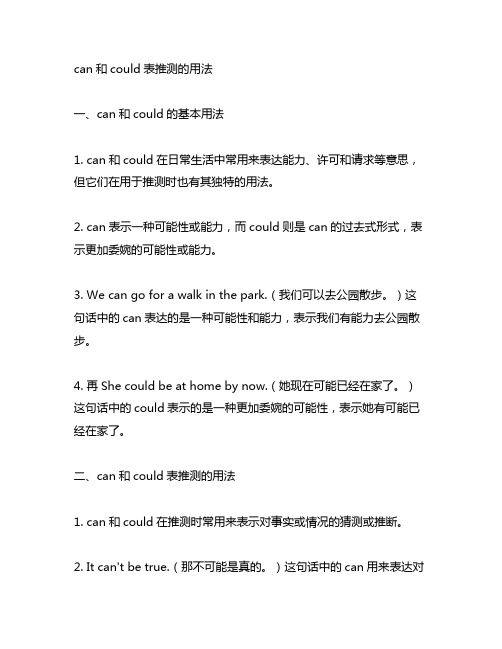
can和could表推测的用法一、can和could的基本用法1. can和could在日常生活中常用来表达能力、许可和请求等意思,但它们在用于推测时也有其独特的用法。
2. can表示一种可能性或能力,而could则是can的过去式形式,表示更加委婉的可能性或能力。
3. We can go for a walk in the park.(我们可以去公园散步。
)这句话中的can表达的是一种可能性和能力,表示我们有能力去公园散步。
4. 再She could be at home by now.(她现在可能已经在家了。
)这句话中的could表示的是一种更加委婉的可能性,表示她有可能已经在家了。
二、can和could表推测的用法1. can和could在推测时常用来表示对事实或情况的猜测或推断。
2. It can't be true.(那不可能是真的。
)这句话中的can用来表达对某事情不可能性的推测。
3. 再She could have missed the tr本人n.(她可能错过了火车。
)这句话中的could表达了对她错过火车的推测。
4. can和could还可以用来表达对过去事件的推测,He could have taken the wrong turn.(他可能走错了路。
)5. can和could还可以用来表示对将来可能发生的事情的推测,It could r本人n tomorrow.(明天可能会下雨。
)三、can和could的注意事项1. 在一般现在时和一般将来时中,can和could用来表示推测时,其否定形式为can't和couldn't。
2. She can't be at home now.(她现在不可能在家。
)这句话中的can't表示推测的否定形式。
3. 而在一般过去时中,could的否定形式为couldn't,He couldn't have finished the work so fast.(他不可能这么快就完成了工作。
小学英语语法can 和 could 的用法
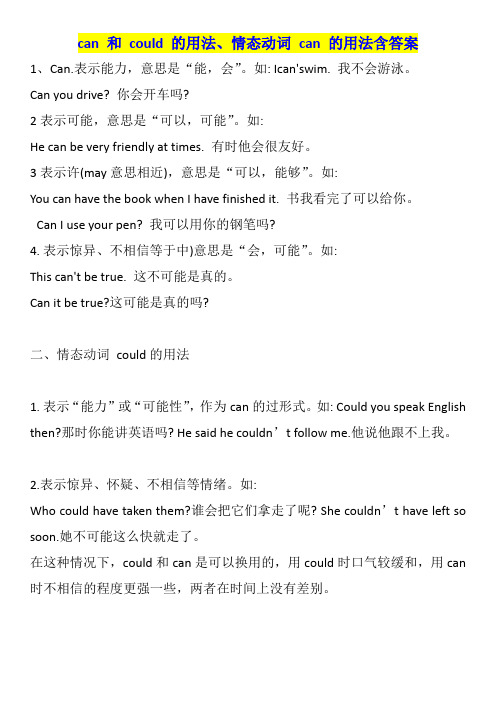
can 和could 的用法、情态动词can 的用法含答案1、Can.表示能力,意思是“能,会”。
如: Ican'swim. 我不会游泳。
Can you drive? 你会开车吗?2表示可能,意思是“可以,可能”。
如:He can be very friendly at times. 有时他会很友好。
3表示许(may意思相近),意思是“可以,能够”。
如:You can have the book when I have finished it. 书我看完了可以给你。
Can I use your pen? 我可以用你的钢笔吗?4.表示惊异、不相信等于中)意思是“会,可能”。
如:This can't be true. 这不可能是真的。
Can it be true?这可能是真的吗?二、情态动词could的用法1.表示“能力”或“可能性”,作为can的过形式。
如: Could you speak English then?那时你能讲英语吗? He said he couldn’t follow me.他说他跟不上我。
2.表示惊异、怀疑、不相信等情绪。
如:Who could have taken them?谁会把它们拿走了呢? She couldn’t have left so soon.她不可能这么快就走了。
在这种情况下,could和can是可以换用的,用could时口气较缓和,用can 时不相信的程度更强一些,两者在时间上没有差别。
3.比较委婉客气地提出问题或陈述看法。
如:-Could you let me have your passport? -可以让我看看你的护照吗?-Yes,here it is.行,这就是。
I could come earlier,ifnecessary. 如果必要我可以早点来。
这时could和can没有时间上的差别。
4.在虚拟条件句中构成谓语。
如:I would certainly do it for you ifI could.要是我能做得到,我一定会为你们做这事儿。
can和could表示推测的用法
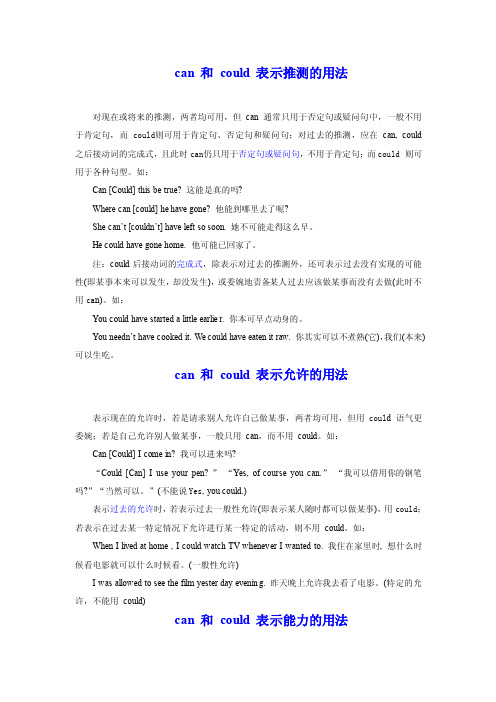
can 和could 表示推测的用法对现在或将来的推测,两者均可用,但can 通常只用于否定句或疑问句中,一般不用于肯定句,而could则可用于肯定句、否定句和疑问句;对过去的推测,应在can, could 之后接动词的完成式,且此时can仍只用于否定句或疑问句,不用于肯定句;而could则可用于各种句型。
如:Can [Could] this be true? 这能是真的吗?Where can [could] he have gone? 他能到哪里去了呢?Shecan’t[couldn’t]haveleftsosoon.她不可能走得这么早。
He could have gone home. 他可能已回家了。
注:could后接动词的完成式,除表示对过去的推测外,还可表示过去没有实现的可能性(即某事本来可以发生,却没发生),或委婉地责备某人过去应该做某事而没有去做(此时不用can)。
如:You could have started a littleearlier. 你本可早点动身的。
Youneedn’thavecookedit. We could have eaten it raw. 你其实可以不煮熟(它),我们(本来)可以生吃。
can 和could 表示允许的用法表示现在的允许时,若是请求别人允许自己做某事,两者均可用,但用could语气更委婉;若是自己允许别人做某事,一般只用can,而不用could。
如:Can [Could] I come in? 我可以进来吗?“Could [Can] I use your pen? ”“Yes, of courseyou can.”“我可以借用你的钢笔吗?”“当然可以。
”(不能说Yes, you could.)表示过去的允许时,若表示过去一般性允许(即表示某人随时都可以做某事),用could;若表示在过去某一特定情况下允许进行某一特定的活动,则不用could。
Can和could的用法和区别
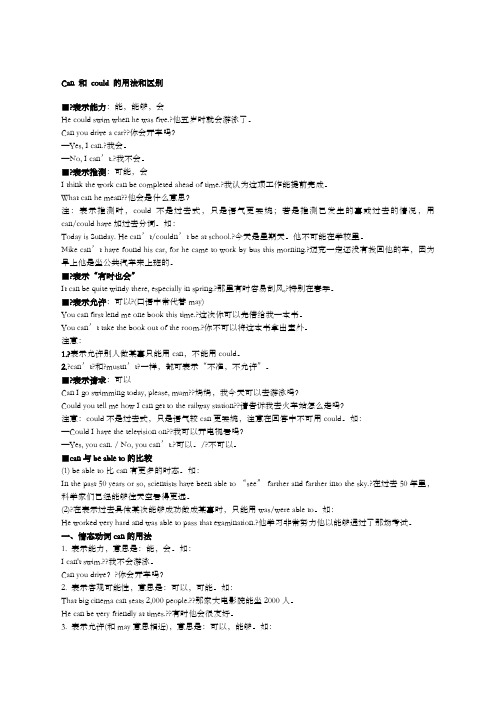
Can 和could 的用法和区别■?表示能力:能,能够,会He could swim when he was five.?他五岁时就会游泳了。
Can you drive a car??你会开车吗?—Yes, I can.?我会。
—No, I can’t.?我不会。
■?表示推测:可能,会I think the work can be completed ahead of time.?我认为这项工作能提前完成。
What can he mean??他会是什么意思?注:表示推测时,could不是过去式,只是语气更委婉;若是推测已发生的事或过去的情况,用can/could have加过去分词。
如:Today is Sunday. He can’t/couldn’t be at school.?今天是星期天。
他不可能在学校里。
Mike can’t have found his car, for he came to work by bus this morning.?迈克一定还没有找回他的车,因为早上他是坐公共汽车来上班的。
■?表示“有时也会”It can be quite windy there, especially in spring.?那里有时容易刮风,?特别在春季。
■?表示允许:可以?(口语中常代替may)You can first lend me one book this time.?这次你可以先借给我一本书。
You can’t take the book out of the room.?你不可以将这本书拿出室外。
注意:1.?表示允许别人做某事只能用can,不能用could。
2.?can’t?和?mustn’t?一样,都可表示“不准,不允许”。
■?表示请求:可以Can I go swimming today, please, mum??妈妈,我今天可以去游泳吗?Could you tell me how I can get to the railway station??请告诉我去火车站怎么走吗?注意:could不是过去式,只是语气较can更委婉,注意在回答中不可用could。
can与could的用法归纳
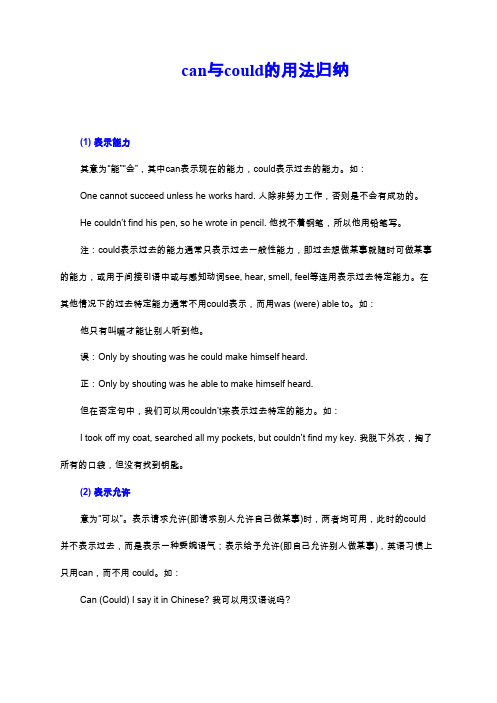
can与c ould的用法归纳(1) 表示能力其意为“能”“会”,其中can表示现在的能力,could表示过去的能力。
如:One cannot succeed unless he works hard. 人除非努力工作,否则是不会有成功的。
He couldn’t find his pen, so he wrote in pencil. 他找不着钢笔,所以他用铅笔写。
注:could表示过去的能力通常只表示过去一般性能力,即过去想做某事就随时可做某事的能力,或用于间接引语中或与感知动词see, hear, smell, feel等连用表示过去特定能力。
在其他情况下的过去特定能力通常不用could表示,而用was (were) able to。
如:他只有叫喊才能让别人听到他。
误:Only by shouting was he could make himself heard.正:Only by shouting was he able to make himself heard.但在否定句中,我们可以用couldn’t来表示过去特定的能力。
如:I took off my coat, searched all my pockets, but couldn’t find my key. 我脱下外衣,掏了所有的口袋,但没有找到钥匙。
(2) 表示允许意为“可以”。
表示请求允许(即请求别人允许自己做某事)时,两者均可用,此时的could 并不表示过去,而是表示一种委婉语气;表示给予允许(即自己允许别人做某事),英语习惯上只用can,而不用 could。
如:Can (Could) I say it in Chinese? 我可以用汉语说吗?“Can (Could) I borrow your umbrella?” “Yes, of course you can.” “我可以借用一下你的雨伞吗?”“当然可以。
”(不能说 Yes, you could.)注:以上说的是针对现在或将来情况而言的,若谈的是过去情况,则过去could只用于表示过去一般性允许(即表示某人随时都可以做某事),而不表示特定的允许(即表示在过去某一特定情况下允许进行某一特定的活动),遇此情况需换成其他表达。
英语重点词汇can和could用法辨析详解

英语重点词汇can和could用法辨析详解1、can的用法(1)表示体力和脑力方面的能力。
He can speak a little English now. 他现在能说一点英语。
(2)表示对现在的动作或状态进行主观的猜测,主要用在否定句和疑问句中。
(3)表示可能性,理论上的可能性,意为“有时候可能会”,可用于肯定句。
(4)表示允许,意思与may接近。
(5)表示说话人的推测、怀疑、惊异、猜测或不肯定等,主要用于否定句、疑问句或感叹句中。
I wonder if my long lost neighbor can/could still be alive.我怀疑我失踪已久的邻居是否还有可能活着。
Such things can/could and do happen.这样的事情可能而且确实发生了。
(6)can的特殊句型cannot…too / enough表示“无论怎么……也不过分”。
“越……越好”。
You cannot be too careful to cross the street. You cannot be careful enough to ross the street.过马路的时候,你怎么小心都不为过。
We cannot put too much emphasis on grammar when learning written English.学习书面英语时,我们再怎么强调语法也不为过。
(We can neverput toomuch emphasis on grammar when learning written English.)We cannot put enough emphasis on grammar when learning written English.学习书面英语时,我们再怎么强调语法也不为过。
I can hardly praise this film too highly.这部电影评价再高也不为过。
could can的用法
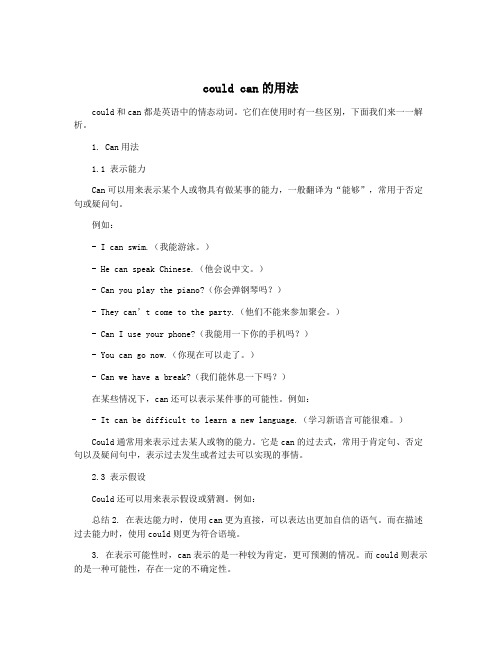
could can的用法could和can都是英语中的情态动词。
它们在使用时有一些区别,下面我们来一一解析。
1. Can用法1.1 表示能力Can可以用来表示某个人或物具有做某事的能力,一般翻译为“能够”,常用于否定句或疑问句。
例如:- I can swim.(我能游泳。
)- He can speak Chinese.(他会说中文。
)- Can you play the piano?(你会弹钢琴吗?)- They can’t come to the party.(他们不能来参加聚会。
)- Can I use your phone?(我能用一下你的手机吗?)- You can go now.(你现在可以走了。
)- Can we have a break?(我们能休息一下吗?)在某些情况下,can还可以表示某件事的可能性。
例如:- It can be difficult to learn a new language.(学习新语言可能很难。
)Could通常用来表示过去某人或物的能力。
它是can的过去式,常用于肯定句、否定句以及疑问句中,表示过去发生或者过去可以实现的事情。
2.3 表示假设Could还可以用来表示假设或猜测。
例如:总结2. 在表达能力时,使用can更为直接,可以表达出更加自信的语气。
而在描述过去能力时,使用could则更为符合语境。
3. 在表示可能性时,can表示的是一种较为肯定,更可预测的情况。
而could则表示的是一种可能性,存在一定的不确定性。
4. 在使用can和could时,注意区分它们的语境,避免语法错误和表达不当所带来的误解。
掌握can和could的使用方法,能够提高我们的英语表达水平,也能够为我们在实际交流中带来更好的效果。
我们还需要不断地扩充自己的词汇量,了解更多的语法和用法,才能够更加熟练地使用英语,表达自己的想法和意见。
除了can和could,情态动词还包括might、may、must、shall、should、will、would等等。
情态动词can与could用法归纳
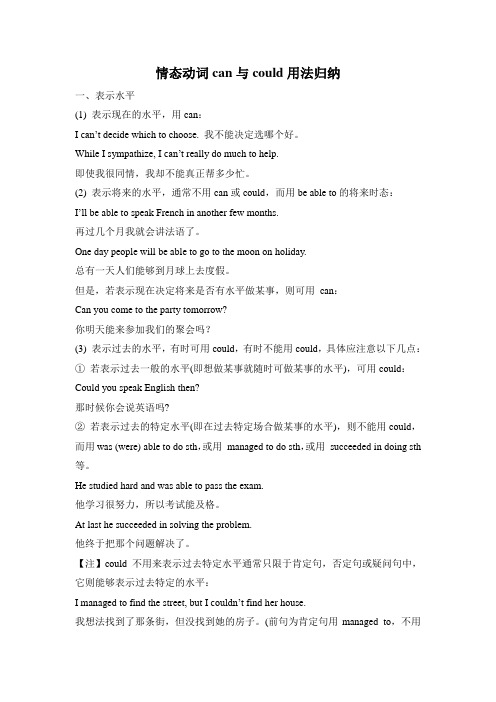
情态动词can与could用法归纳一、表示水平(1) 表示现在的水平,用can:I can’t decide which to choose. 我不能决定选哪个好。
While I sympathize, I can’t really do much to help.即使我很同情,我却不能真正帮多少忙。
(2) 表示将来的水平,通常不用can或could,而用be able to的将来时态:I’ll be able to speak French in another few months.再过几个月我就会讲法语了。
One day people will be able to go to the moon on holiday.总有一天人们能够到月球上去度假。
但是,若表示现在决定将来是否有水平做某事,则可用can:Can you come to the party tomorrow?你明天能来参加我们的聚会吗?(3) 表示过去的水平,有时可用could,有时不能用could,具体应注意以下几点:①若表示过去一般的水平(即想做某事就随时可做某事的水平),可用could:Could you speak English then?那时候你会说英语吗?②若表示过去的特定水平(即在过去特定场合做某事的水平),则不能用could,而用was (were) able to do sth,或用managed to do sth,或用succeeded in doing sth 等。
He studied hard and was able to pass the exam.他学习很努力,所以考试能及格。
At last he succeeded in solving the problem.他终于把那个问题解决了。
【注】could 不用来表示过去特定水平通常只限于肯定句,否定句或疑问句中,它则能够表示过去特定的水平:I managed to find the street, but I couldn’t find her house.我想法找到了那条街,但没找到她的房子。
- 1、下载文档前请自行甄别文档内容的完整性,平台不提供额外的编辑、内容补充、找答案等附加服务。
- 2、"仅部分预览"的文档,不可在线预览部分如存在完整性等问题,可反馈申请退款(可完整预览的文档不适用该条件!)。
- 3、如文档侵犯您的权益,请联系客服反馈,我们会尽快为您处理(人工客服工作时间:9:00-18:30)。
Can/could的用法
1.can/could都属于情态动词,
本身有各种意义,具体在句子中不同。
2.情态动词不能单独作谓语,
只能和动词一起构成谓语。
3.情态动词没有人称和数量的变化。
4.表示说话人的语气和情感。
Can/could的几种句式:
肯定句否定句缩略式
can can not can’t
could could not couldn’t
疑问句:
can you…….?
could you…...?
Can/could用法共同点:
1.都表示具备的能力,指现在、过去无论什么时候想做就能做到的能力。
Could表示过去的能力,can表示现在或将来的能力。
2.在否定句和疑问句中,都表示猜测语气。
Can表示猜测的可能性要多些,而could表示猜测的可能性要小、轻些。
3.都可以表示建议和请求,
can表示肯定,could的请求语气更委婉。
Can与could用法不同点:
1.can的语气肯定,could语气比较委婉。
2.can通常用在表示现在的事情,
3.could用在表示过去的事情。
4.当表示允许别人做某事时,
用can而不用could.
一、判断下列句子的用法:
1.A hen can’t swim.
2.How can that be true?
3.Could you pass the paper to me?
4.I couldn’t play the piano until I was fifteen years old.
5.What you said couldn’t be t rue.
6.Can I take this seat?
7.Could I use your phone?
8.Yes,of course you can.
二、选择题
1. At that time we thought the story_____ not be true.
A)could B)must C)can
2. You___ the work better in the future.
A)could did B)can do C)could do
3.The room is dirty; it ____cleaned.
A) can‘t be B) couldn’t be
C) mustn't be
4.Mary ____my letter, because she is worring about it now.
A) should receive B) can’t receive
C) couldn't receive
5.An Englishman who ____not speak Chinese in China.
A) must B) could C) can
6.Mr Wang ______ write last year, he was ill for three years.
A. mustn’t
B. couldn’t
C. can’t
7. –Who is the man over there? Is it Mr Li?
--No, it ______ be him. Mr Li is much taller.
A. mustn’t
B. could not
C. can’t
8.Could I seat here?
Yes, of course you _______.
A.can
B.could
C.must
三、按要求完成句子
1. He can ride a bike. (改一般疑问句和否定句,并作肯定和否定回答)
一般疑问句_________________________________________
否定句_________________________________________
肯定回答______________否定回答______________
2.你会弹吉他吗?
_____ you _____ ______ guitar?
3.两年前我不会骑自行车。
I ______ ______a bike two years ______.
四、下列各句均有一处错误,请指出并改正
1.He can speaks English very well.
A B C D
2.Can you play a piano?
A B C D
3.He doesn’t buy something his brother.
A B C D
4.I couldn’t speak Japanese when I am four.
A B C D
5.What can you sister does?
A B C D。
